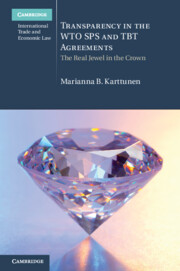Book contents
- Transparency in the WTO SPS and TBT Agreements
- Cambridge International Trade and Economic Law
- Transparency in the WTO SPS and TBT Agreements
- Copyright page
- Dedication
- Contents
- Figures
- Tables
- Foreword
- Acknowledgements
- Abbreviations
- Table of Cases
- Country Classification
- Introduction
- Part I Why the SPS and TBT Agreements?
- 1 The Legal Principles Applying to Domestic Regulations under the SPS and TBT Agreements
- 2 Transparency as a Core Principle under the SPS and TBT Agreements
- 3 International Regulatory Co-operation under the SPS and TBT Agreements
- Conclusion of Part I
- PART II Transparency as a Substitute for Dispute Settlement
- Part III Transparency as a Complement to Dispute Settlement
- Conclusion
- Appendices
- References
- Index
1 - The Legal Principles Applying to Domestic Regulations under the SPS and TBT Agreements
Finding a Balance between Regulatory Autonomy and Free Trade
from Part I - Why the SPS and TBT Agreements?
Published online by Cambridge University Press: 28 April 2020
- Transparency in the WTO SPS and TBT Agreements
- Cambridge International Trade and Economic Law
- Transparency in the WTO SPS and TBT Agreements
- Copyright page
- Dedication
- Contents
- Figures
- Tables
- Foreword
- Acknowledgements
- Abbreviations
- Table of Cases
- Country Classification
- Introduction
- Part I Why the SPS and TBT Agreements?
- 1 The Legal Principles Applying to Domestic Regulations under the SPS and TBT Agreements
- 2 Transparency as a Core Principle under the SPS and TBT Agreements
- 3 International Regulatory Co-operation under the SPS and TBT Agreements
- Conclusion of Part I
- PART II Transparency as a Substitute for Dispute Settlement
- Part III Transparency as a Complement to Dispute Settlement
- Conclusion
- Appendices
- References
- Index
Summary
This chapter presents the core disciplines under the SPS and TBT Agreements, highlighting how they set requirements for regulators to balance their own public policy objectives with the WTO objectives of trade liberalisation. Such ‘balancing’ requirements result in obligations for regulators to ‘rationalise’ their domestic regulations in order to ensure their quality. This balancing is inherent to all measures under the scope of the SPS and TBT Agreements and stands out in the obligations not to discriminate and to adopt only measures that are necessary and/or based on scientific evidence. Ultimately, the purpose of this chapter is to highlight that transparency and related regulatory dialogue is fundamental to help both regulating Members and complaining parties in determining the consistency of domestic regulation with WTO SPS and TBT Agreements.
Keywords
- Type
- Chapter
- Information
- Transparency in the WTO SPS and TBT AgreementsThe Real Jewel in the Crown, pp. 23 - 45Publisher: Cambridge University PressPrint publication year: 2020



